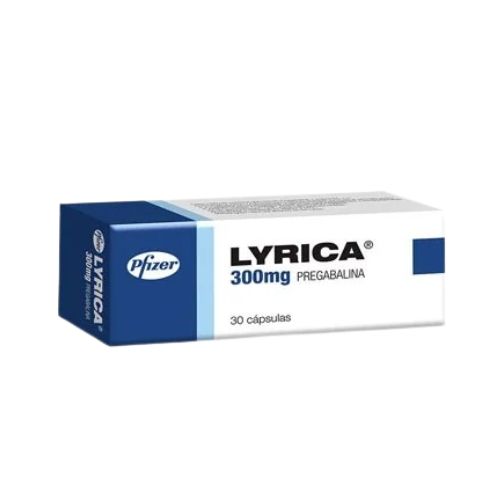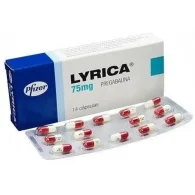Sorry, nothing in cart.
Lyrica 300mg
In Stock
Available Options
| pack size | Price | Quantity | |
|---|---|---|---|
| 100 Capsules | $125.00 | ||
| 200 Capsules | $240.00 | ||
| 300 Capsules | $350.00 | ||
| 50 Capsules | $85.00 |
Quick Overview
| Brand Name: | Lyrica 300 mg |
| Generic Name: | Pregabalin |
| Active Ingredient: | Pregabalin |
| Manufacturer: | Pfizer |
| Drug Class: | Anticonvulsant |
| Strength: | 300 mg |
| SKU: | LRC300 |
| Packaging: | 14 capsules in 1 strip |
| Treatment: | Diabetic nerve damage, Fibromyalgia |
| Time Duration: | Time to work 30 to 60 minutes |
| Price: | $85.00 To $350.00 |
Product Description
Lyrica 300mg known as pregabalin, is a medication widely used for treating a variety of conditions involving nerve pain associated with diabetes, herpes zoster, and certain types of seizures. Available in different dosages, including 300mg, Lyrica has gained attention for its effectiveness in managing chronic pain of fibromyalgia, and postherpetic neuralgia, and improving the quality of life for many patients.
What is Lyrica 300mg?
Lyrica 300mg capsules is a prescription medication used to treat several conditions manufactured by Pfizer, primarily treating nerve pain and certain types of seizures. Its active ingredient is pregabalin, which belongs to a class of drugs known as anticonvulsants or antiepileptic medications. Lyrica works by affecting the neurotransmitters in the brain to reduce the release of substances that cause pain and seizures.
Lyrica 300mg is a restricted drug. It is classified as a Schedule V prescription medication. Schedule V medicines are valid for medical use, but they can also develop psychological or physical dependence. This indicates that the substance could be abused.
How Lyrica 300mg work
Lyrica 300 mg effects as an anticonvulsant and neuropathic pain agent. It is structurally related to the neurotransmitter gamma-aminobutyric acid (GABA), but it does not function in the same way. Instead, pregabalin binds to the alpha-2-delta subunit of voltage-gated calcium channels in the central nervous system. This action helps to modulate the release of several neurotransmitters, including glutamate, norepinephrine, and substance P, thereby reducing the sensation of pain and controlling seizures, neuropathic pain, fibromyalgia, anxiety
what is Lyrica 300 mg used for
lyrica 300mg Pfizer is primarily prescribed for the following conditions:
- Neuropathic Pain: arises from nerve damage, often presenting as a burning, shooting, or stabbing sensation. Conditions that can cause neuropathic pain include diabetic neuropathy, postherpetic neuralgia (pain following shingles), and spinal cord injuries. Lyrica helps alleviate this type of pain by stabilizing the overactive nerve signals.
- Fibromyalgia: is a chronic disorder characterized by widespread musculoskeletal pain, fatigue, and tenderness in localized areas. Lyrica 300 has been shown to reduce the intensity of pain and improve sleep quality and overall well-being in patients with fibromyalgia.
- Epilepsy: Lyrica is used as an adjunctive therapy for partial-onset seizures in adults. When combined with other antiepileptic medications, Lyrica 300 mg can help control seizures more effectively.
- Anxiety Disorder (GAD): In some countries, Lyrica 300 mg capsule is also approved for the treatment of generalized anxiety disorder. It can help reduce the symptoms of anxiety, including restlessness, irritability, and difficulty concentrating.
- Improved Sleep Quality: Chronic pain often interferes with sleep, leading to a cycle of pain and sleep deprivation. 300 mg of Lyrica helps break this cycle by reducing pain and improving sleep quality, allowing patients to rest better and recover more efficiently.
- Seizure Control: For patients with epilepsy, controlling seizures is crucial to maintaining a normal lifestyle. Lyrica 300mg, when used alongside other medications, can significantly reduce the frequency and severity of seizures.
- Anxiety Relief: For those with generalized anxiety disorder, Lyrica provides relief from persistent anxiety symptoms, improving daily functioning and overall quality of life.
Side effects of Lyrica 300 mg
Lyrica 300mg can cause side effects. The severity of these side effects can vary depending on the individual. Here are some common and serious side effects associated with Lyrica:
Common Side Effects
- Dizziness: Often reported, especially when starting the medication or increasing the dose.
- Drowsiness: Many people experience increased drowsiness, which can impact daily activities and concentration.
- Weight Gain: This can occur due to increased appetite and fluid retention.
- Swelling: Peripheral edema, or swelling in the arms, legs, or other parts of the body, is a common side effect.
- Dry Mouth: Some individuals experience a dry or sore throat.
- Blurred Vision: Vision changes can occur but are usually temporary.
- Fatigue: Feeling unusually tired or weak is a reported side effect.
- Constipation: Digestive issues, including constipation, can occur.
Serious Side Effects
- Allergic Reactions: Severe reactions such as rash, itching, swelling, or trouble breathing. If these occur, seek medical attention immediately.
- Mood Changes: This can include depression, anxiety, or unusual changes in mood or behavior. In rare cases, it can lead to suicidal thoughts.
- Severe Skin Reactions: Conditions like Stevens-Johnson syndrome, which cause severe skin and mucous membrane reactions, although rare.
- Muscle Pain or Weakness: Significant muscle pain, tenderness, or weakness, especially in combination with fever, may indicate a serious condition.
- Unusual Bleeding or Bruising: This could be a sign of a serious condition affecting blood cells.
- Increased Seizures: Although Lyrica is used to manage seizures, in rare cases, it can increase seizure frequency or intensity.
What to Do
- Report Side Effects: Inform your healthcare provider about any side effects you experience. They may adjust your dose or suggest an alternative treatment.
- Emergency Care: Seek immediate medical help for severe allergic reactions, severe skin reactions, or any symptoms of a serious condition.
- Regular Monitoring: Regular follow-ups with your healthcare provider are important to monitor your response to the medication and manage any side effects.
Always discuss any concerns or unusual symptoms with your healthcare provider to ensure the medication is working effectively and safely for you.
Potential Withdrawal Symptoms of Lyrica
- Anxiety or Irritability: Some individuals may experience heightened anxiety or irritability.
- Insomnia: Difficulty sleeping can occur during withdrawal.
- Nausea and Vomiting: Gastrointestinal symptoms like nausea or vomiting might arise.
- Sweating: Excessive sweating can be a withdrawal symptom.
- Seizures: Although rare, there’s a risk of seizures, particularly if Lyrica was used to control seizure disorders.
Other Substitute
Pregnancy and Breastfeeding
The safety of Lyrica 300 during pregnancy and breastfeeding is not well-established. Pregnant or breastfeeding women should only use Lyrica if the potential benefits outweigh the risks, and they should do so under close medical supervision.
Lyrica 300mg Dosage Adjustments
The dosage of Lyrica 300 mg can vary based on the condition being treated, the patient’s response to the medication, and any potential side effects.
For General Dosing Schedule Adjustment:
- Starting Dose: For most conditions, treatment often starts with a lower dose to minimize side effects. For example, neuropathic pain, might start at 75mg per day with or without food, divided into two or three doses.
- Titration: The dose is usually increased gradually. Your doctor might adjust the dose based on your response and tolerance. Commonly, the dose is increased by 150 mg per day at weekly intervals until the desired effect is achieved or side effects become significant.
- Maximum Dose: The maximum recommended dose can vary. For neuropathic pain and fibromyalgia, it often goes up to 300 mg per day, divided into two or three doses with or without food. For seizure disorders, the maximum dose might also be around 300 mg per day.
Lyrica 300mg Drug Interactions
Lyrica (pregabalin) 300 mg can interact with several other medications and substances.
- Central Nervous System (CNS) Depressants:
- Examples: Benzodiazepines (e.g., diazepam, lorazepam), opioids (e.g., oxycodone, morphine), alcohol.
- Interaction: Combining Lyrica with other CNS depressants can increase the risk of sedation, dizziness, and impaired motor coordination. This can be particularly concerning when driving or operating machinery.
- Other Antiepileptic Drugs:
- Examples: Carbamazepine, phenytoin.
- Interaction: While Lyrica is used for seizure disorders, combining it with other antiepileptic drugs may require careful monitoring to avoid additive effects or interactions affecting seizure control.
- Diabetes Medications:
- Examples: Insulin, oral hypoglycemics.
- Interaction: Lyrica can cause weight gain and fluid retention, which might affect blood sugar control and the effectiveness of diabetes medications. Regular monitoring of blood glucose levels is advisable.
- Certain Antidepressants:
- Examples: SSRIs (e.g., fluoxetine, sertraline), SNRIs (e.g., venlafaxine).
- Interaction: Combining Lyrica with certain antidepressants may increase the risk of serotonin syndrome, a potentially serious condition. Monitor for symptoms like confusion, agitation, or rapid heart rate.
- Drugs Affecting Renal Function:
- Examples: Nonsteroidal anti-inflammatory drugs (NSAIDs), and certain antibiotics.
- Interaction: Since Lyrica is primarily excreted through the kidneys, drugs that affect renal function may alter Lyrica levels or increase the risk of side effects. Kidney function should be monitored if taking such drugs.
- Hydrocodone:
- Interaction: Specifically, hydrocodone can interact with Lyrica to enhance the effects of both drugs, leading to increased sedation and the risk of respiratory depression.
- Grapefruit Juice:
- Interaction: While not a medication, grapefruit juice can affect the metabolism of many drugs. Although Lyrica is not directly known to interact with grapefruit juice, it’s always best to consult your healthcare provider about any potential interactions with dietary substances.
Conclusion
Lyrica 300mg is a valuable medication for managing neuropathic pain, fibromyalgia, epilepsy, and generalized anxiety disorder. Its effectiveness in reducing pain, controlling seizures, and improving the quality of life for many patients makes it a crucial tool in the medical arsenal. However, like all medications, it comes with potential side effects and considerations that patients and healthcare providers must carefully manage. By understanding the benefits and risks associated with Lyrica 300mg, patients can make informed decisions about their treatment and work towards achieving better health outcomes.
FAQs
Q1) What is the effect of Lyrica 300mg on sleep?
Ans: Lyrica 300 mg often causes drowsiness or sedation, which can be beneficial if you have trouble falling asleep or staying asleep. This effect may help individuals with insomnia or disrupted sleep patterns. If you experience excessive drowsiness, it might be necessary to adjust the timing of your dose or the dosage itself. Consult with your healthcare provider for adjustments.
Q2) What is the price of Lyrica 300mg in U.K?
Ans: The price of Lyrica 300 mg capsules in the U.K. can vary depending on several factors, including whether you’re purchasing it privately or through an online store, and if you’re using brand-name Lyrica or a generic version. If you are purchasing from pils4cure pharmacy store the price for brand-name Lyrica 300 mg is $125 for 100 capsules.
Q3) Lyrica 300mg can relieve muscle spasms?
Ans: Lyrica 300 mg capsule effect on nerve pain and its ability to affect nervous system activity might provide some relief for muscle spasms, particularly if they are related to nerve issues or conditions like fibromyalgia.
Q4) Lyrica 300 capsule can treat postherpetic neuralgia?
Ans: Lyrica capsules are commonly prescribed to manage postherpetic neuralgia (PHN), a condition characterized by persistent nerve pain following a shingles infection. Lyrica works in treating PHN.
Q5) is Lyrica an opioid ?
Ans: Lyrica is not an opioid. It is a medication that is often prescribed to treat nerve pain, fibromyalgia, and certain types of seizures. Pregabalin works by affecting the way nerves send messages to the brain, but it does so through a different mechanism than opioids. While opioids target opioid receptors to relieve pain, Lyrica (pregabalin) modulates calcium channels in the nervous system to reduce pain and other symptoms.
Additional information
| pack size | 50 Capsules, 100 Capsules, 200 Capsules, 300 Capsules |
|---|



























Reviews
There are no reviews yet.